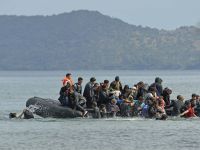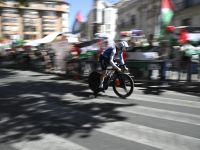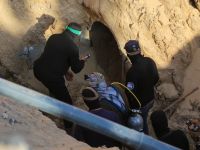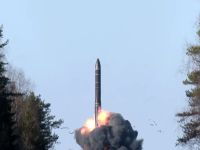Most members of the UN Security Council blamed Israel on Tuesday for the bloodshed in Jerusalem and the West Bank, but all stressed the importance of peace talks due to take place in Paris.
Most speakers in an emotionally charged council debate expressed shock at the shooting of Mohammed Al-Durra, a 12-year-old Palestinian boy who died in his father's arms as he sheltered behind a wall in Gaza on Friday.
But while the US ambassador to the United Nations, Richard Holbrooke, said "now is not the time to be apportioning blame," others said the violence was triggered by Israeli opposition leader Ariel Sharon.
The Palestinian observer to the UN, Nasser Al-Kidwa, who was invited to speak first, described Sharon's visit on Thursday to the al-Aqsa mosque compound on Temple Mount in Jerusalem as "provocative and insulting".
But, Al-Kidwa said, it was the Israeli security forces, which were responsible for the ensuing heavy loss of life.
By Tuesday evening, the clashes had claimed 63 lives, almost all of them Palestinians or Israeli Arabs.
Seated at one end of the horseshoe-shaped table in the Security Council chamber, Al-Kidwa spoke haltingly, sometimes with tears in his eyes.
He urged the council to carry out its "very specific responsibility to bring to end the bloody campaign by Israeli security forces and violations of the fourth Geneva Convention" on protecting civilians in time of war.
If it did so, he said, it would help create an environment in which the peace process might be revived.
In reply, the Israeli ambassador to the UN, Yehuda Lancry, laid the blame for the violence squarely on Palestinian leader Yasser Arafat.
"Let there be no doubt, we are not faced with peaceful demonstrators, but rather with a coordinated escalation of violent confrontation throughout the West Bank and Gaza," he said.
He accused the Palestinian authority of breaking negotiated agreements on the use of firearms by Palestinian police, and said "there have been numerous instances of live fire emanating from rioting crowds."
Israel, he said, was "committed to achieving a peace settlement with our Palestinian partners, even in the face of such violence."
The meeting due to take place between Arafat and Israeli Premier Ehud Barak in Paris on Wednesday was "an ideal opportunity to achieve this," Lancry said.
Holbrooke said "the world will be watching, the world will be hoping that the cycle of violence will be reversed" by the Paris talks.
He recalled the "extraordinary efforts by the leaders to achieve peace recently, at Camp David, in Europe and elsewhere," and said Israel and the Palestinians had "concluded historic agreements in past and negotiated practical arrangements on the ground."
The French ambassador, Jean-David Levitte, also called on Arafat and Barak "to do all they possibly can to defuse tension."
Violence "plays into the hands of provocateurs and the enemies of peace," he said.
Levitte blamed the violence on "deliberate provocation by Ariel Sharon" and said "France unreservedly condemns his irresponsible visit."
He also criticized Israel's "disproportionate use of armed force" and endorsed Al-Kidwa's call for "international machinery to establish who is responsible."
Among other speakers, Namibia's ambassador to the UN, Martin Andjaba, who holds the rotating council presidency this month, said his country was "deeply shocked, and strongly condemns the violence unleashed by Israeli security forces against civilians" and the "excessive use of force".
Malaysia's ambassador, Agam Hasmy, said Sharon's act was "a brazen act intended to provoke Palestinian reaction", and "a blatantly cynical and irresponsible use of power." -- UNITED NATIONS (AFP)
© 2000 Al Bawaba (www.albawaba.com)









